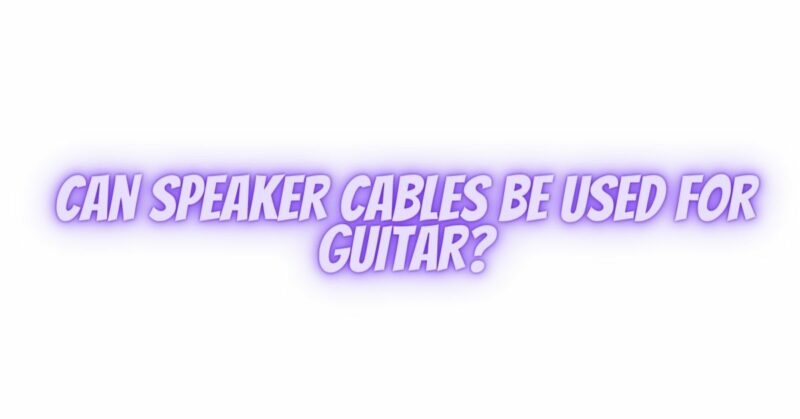Musicians often face the challenge of connecting their guitars to amplifiers or other audio equipment. While it may seem convenient to use the cables readily available, such as speaker cables, questions arise about whether this is a suitable choice. In this article, we will explore the compatibility of speaker cables for guitars, the differences between speaker cables and instrument cables, and when it’s appropriate to use each type of cable.
Understanding Speaker Cables and Instrument Cables
- Speaker Cables:
- Speaker cables are designed to carry high-power electrical signals from amplifiers to loudspeakers.
- They typically feature thicker conductors and are designed to handle high-power audio signals.
- Speaker cables are not shielded and are meant to transmit amplified audio over relatively short distances.
- Instrument Cables (Guitar Cables):
- Instrument cables, commonly known as guitar cables, are specifically designed for connecting electric guitars and other instruments to amplifiers, effects pedals, or audio interfaces.
- They use shielded conductors to prevent interference and noise, ensuring clean and clear transmission of low-level instrument signals.
- Instrument cables come with various connector types, such as 1/4-inch jacks, and are available in different lengths to accommodate various setups.
Using Speaker Cables for Guitars: Pros and Cons
Pros:
- Availability: Speaker cables are often readily available, and musicians may have them on hand in their setups.
- Robust Construction: Speaker cables are built to withstand high-power audio signals, making them durable and less likely to be damaged by heavy use.
Cons:
- Impedance Mismatch: Speaker cables have lower impedance (typically 4-8 ohms) compared to instrument cables (typically 20,000 ohms or more). This impedance mismatch can cause a poor match between the guitar and the amplifier, resulting in tonal degradation and signal loss.
- Signal Loss and Interference: Speaker cables are not shielded like instrument cables, making them more susceptible to interference and noise. This can introduce unwanted hum and hiss into the guitar signal.
- Tonal Quality: Using speaker cables for guitars can affect the overall tonal quality and dynamics of the instrument, leading to a less desirable sound.
When Can You Use Speaker Cables for Guitars?
While it’s generally advisable to use dedicated instrument cables for connecting guitars to amplifiers and audio equipment, there are situations where speaker cables can be used temporarily or as a last resort:
- Emergency Use: In cases where no instrument cables are available, using a speaker cable temporarily may suffice to establish a connection, but it’s not recommended for long-term use.
- Short Cable Runs: For very short cable runs (a foot or less), the negative effects of using a speaker cable may be minimal. However, it’s still best to use instrument cables when possible.
- Amplifier-to-Pedalboard: If you are connecting an amplifier to a pedalboard or effects rack (rather than directly to the guitar), speaker cables may be used for the amplifier-to-pedalboard connection. However, instrument cables should be used for the guitar-to-pedalboard connection.
Conclusion
In summary, while speaker cables can technically be used for guitars in certain situations, it’s not the recommended choice. Dedicated instrument cables are designed to preserve the integrity of the guitar signal, ensuring the best possible sound quality and minimizing interference. To achieve optimal results and avoid potential tonal degradation and noise issues, it’s advisable to invest in quality instrument cables for connecting your guitar to amplifiers and audio equipment.


